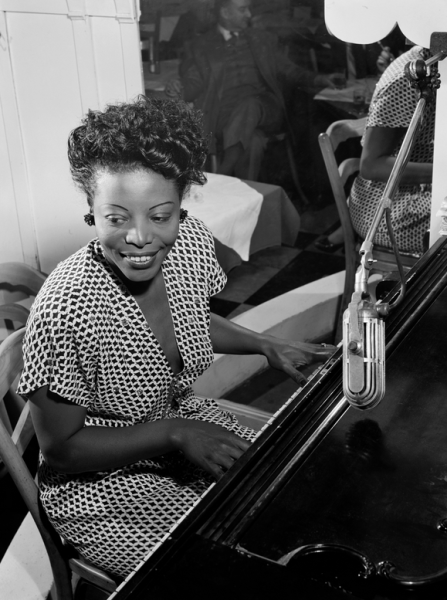When you read biographies of the great musicians, there’s always a certain trepidation. Making immortal music doesn’t make you a good person, and some legendary musicians treated others terribly (Miles Davis, Charles Mingus, James Brown, etc.)
So it’s a relief to read Deanna Witkowski’s new book about Mary Lou Williams, arguably the greatest female jazz pianist and composer (and really, you don’t need that “female” qualifier) of all time.
“Mary Lou Williams: Music for the Soul” makes a case that Williams was not only a fiercely original musician, but about as close to a saint as it gets in modern music. Plus, she literally made music about saints.
“I think of Mary Lou — although I never met her — as a mentor for me, because she’s someone who was able to really integrate her spirituality, her Catholicism, with her music. She was also an experimentalist and she always defined herself as that,” Witkowski says.
Williams was born in 1910 in Atlanta with a “veil”— a thin membrane of placenta over her eyes. “In African American culture, children born with such a veil were believed to have the gift of second sight—an ability to see visions that were not apparent to others,” writes Witkowski.
Her family soon moved to Pittsburgh, and her intuitive mastery of music made Williams known as “the little piano girl” of East Liberty, playing for her neighbors, her school and her stepfather’s poker games.
At the time, Pittsburgh was cranking out more great pianists than any place on Earth; Williams’s high school, Westinghouse, also boasts alumni such as Earl “Fatha” Hines, Billy Strayhorn and Erroll Garner. Williams soon found she could make money for her family, and played everywhere from storied late-night Hill District jam sessions to tours with Andy Kirk’s Twelve Clouds of Joy.

Williams mastered a range of styles, from earthy boogie-woogie to swinging big band arrangements to proto-bebop. She wrote tunes for Benny Goodman and Duke Ellington and mentored bebop revolutionaries from Charlie Parker and Dizzy Gillespie to the mercurial Thelonious Monk.
“Her music was always a little bit ahead of its time,” says Witkowksi. “So if you listen to her now, you could hear music that sounds like Kansas City in the ’30s, and sounds like the early funk influences from the ’70s, all in the same tune.”
Williams was also a person of quiet charity who took care of many jazz musicians, addicts and otherwise, when their money ran out — often opening her home to them at great personal expense.
A deep spiritual longing led to a midlife conversion to Catholicism and Williams turned her innovative instincts toward liturgical music, combining it with jazz in masterpieces such as “Black Christ of the Andes” (1964) about the black Peruvian St. Martín de Porres Velázquez. Williams opened thrift stores in Harlem to benefit impoverished and addicted musicians and put on giant benefit concerts, such as Pittsburgh’s first jazz festival in 1964 at the Civic Arena.
Williams didn’t necessarily see the sacred and the secular as separate when it came to her music; she was able to improvise on a movement from one of her Jazz Masses at a club date, notes Witkowski.
Witkowski’s research brought her to Pittsburgh from New York City and she stayed. She now lives in Greenfield.
“I knew Mary Lou was from here, but I knew like one person in Pittsburgh. I started meeting as many people in the jazz community as I could, and then I ended up coming back here for performances that were usually related to Mary Lou. I played with the (Pittsburgh Symphony Orchestra) as a guest doing a bunch of her music,” says Witkowski.
“I really just kept feeling this really strong sense of community that I didn’t feel so much in New York. And I think that Mary Lou led me to that.”

Witkowski is having a book launch and performance at 6 p.m. on Thursday, Sept. 16, at Con Alma in Downtown Pittsburgh. She’s also hosting a book reading at 7:30 p.m. on Sept. 23 at Riverstone Books in Squirrel Hill.
Witkowski made a record of music by Mary Lou Williams at Manchester Craftsmen’s Guild called “Force of Nature” that will be released on Oct. 22. The album features her regular band, who came in from New York City and Austin to record, along with legendary local musicians Dwayne Dolphin and Roger Humphries. On Oct. 24, she’ll perform “Mary Lou’s Mass” with 12 singers and an instrumental quartet at Sacred Heart Church in Shadyside.

